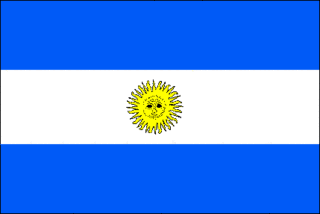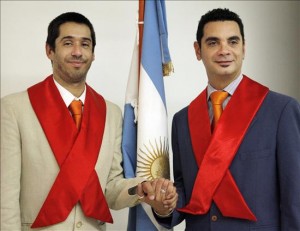 The
TheArgentine Republic’s legalization of same-sex marriage July 15 came as
a complete surprise to those of us who think of Argentina as the land of
machismo, meat-eaters – Argentines are the world's biggest carnivores,
consuming
70 kilos (154 lbs.) of beef per person – and military coups. According
to
“Completely Queer: The Gay and Lesbian Encyclopedia” (1998),
“Argentinians
endured some of the most brutal campaigns of official and unofficial
persecution
of lesbians and gay men anywhere in the 20th century.” After the
military
coup of March 24, 1976, “some 400 gay men were ‘disappeared’ – kidnapped,
barbarically tortured, and executed . . . Encouraged by Roman Catholic
church
leaders, the dictatorship raided and closed gay bars, arresting as many
as 1,400
men in a particularly brutal 1978 campaign that took place on the eve of
the
World Cup soccer tournament in Buenos Aires. In 1982 and 1983, the last
two years of the dictatorship, paramilitary groups assassinated a number
of gay
men working in the arts. . . .” But with the re-establishment of
democracy in the 1990s, “Buenos Aires emerged . . . as the gay capital
of South
America, with vocal rights organizations and a lively gay and lesbian
media
presence.”
qualified
to lead Latin America in the field of LGBT rights and equality. Civil
unions are already recognized in Buenos Aires (2002), the Province of

Rio Negro
(2003) and the cities of Villa Carlos Paz (2007) and Rio Cuarto (2009). On
November 12, 2009 a Buenos Aires court approved the marriage of Alex
Freyre and
José Maria Bello. (Though the Buenos Aires government blocked the
wedding,
the two men were married on December 28 in Ushuaia, in Tierra del
Fuego.)
In late 2009 the Argentine Congress took up a bill to change Article 172
of the
Civil Code to legalize same-sex marriage. The Chamber of Deputies
approved
the measure on May 5 and the Senate on July 15. President Cristina
Fernández de Kirchner, a friend of the LGBT community, ratified the
measure,
which took effect a few days later.
country," said
Maria Rachid, president of the Argentine Lesbian, Gay, Bisexual and
Transgender
Federation. The law "not only recognizes the rights of our families, but
also
the possibility of having access to health care, to leave a pension, to
leave
our assets to the people with whom we have shared many years of life,
including
our children," she said.
right to
celebrate it. But it would be a mistake to think that Argentina has
become
a queer paradise. For one thing, machismo is still rampant in
 that
thatcountry. Diego Maradona (left), Argentina’s soccer god, reacted the way many
Argentinian men would when a reporter at the World Cup – where Maradona
coached
the Argentinian Team – seemed to question Maradona’s fondness for his
players. “No, I have not gone limp wristed," Maradona protested,
vehemently. “But I like to acknowledge and congratulate my players when
they play as well as they did today. That was a pleasing result and
display. It
was a job well done. I still prefer women. I am dating Veronica, who is
blond
and 31 years old." Though Maradona never misses an opportunity to
remind
us he’s a jerk, his eyebrow-raising reaction to a reporter’s innocent
question
indicates that not everything is peachy-keen down Argentine way.
throughout
the land. What goes well in Buenos Aires might not go well in the
countryside, where folks are more religious, macho, and carnivorous. The
same-sex marriage bill was hotly opposed by the Roman Catholic, Mormon
and
evangelical churches, which organized a 60,000-person march on Congress
to
protest the measure. The Cardinal Archbishop of Buenos Aires, Jorge
Mario
Bergoglio, led the fight against same-sex marriage, saying that
"children need
to have the right to be raised and educated by a father and a
mother." Another opponent, Senator Juan Perez Alsina, called
marriage between a man and a woman "essential for the preservation of
the
species." Opponents tried to derail the measure by proposing a weak
civil
unions law as an alternative to “gay marriage,” but they were blocked by
astute
parliamentary maneuvers. “I'm proud that we never tried for civil
unions,
always for complete equality," said Esteban Paulon, the LGBT
Federation's
general secretary.
tenth
country in the world to legalize “gay marriage.” (The others are
Belgium,
Canada, Iceland, the Netherlands, Norway, Portugal, South Africa, Spain
and
Sweden). It also puts to shame the United States, where the Defense
Of Marriage Act is on the books and a majority of states have
constitutional
amendments barring same-sex marriage. “Today's historic vote shows how
far
Catholic Argentina has come, from dictatorship to true democratic
values, and
how far the freedom-to-marry movement has come, as 12 countries on four
continents now embrace marriage equality," said Evan Wolfson, Executive
Director
of Freedom to Marry. “America should lead, not lag, when it comes to
treating everyone equally under the law." Perhaps it helps that
Argentina’s religious lobby is not as powerful as the one in the States,
or that
opposition to same-sex marriage is not a cornerstone of one of its major
political parties, as it is with the Republican Party in the U.S. Here
we
have a long way to go before we catch up to the “carnivores” of the
Argentine
Republic.
is a
South-Florida based freelance writer. Jesse thanks Daniel Curzon, author
of the
1978 gay novel “Among the Carnivores,” for inspiring the title of this
article.